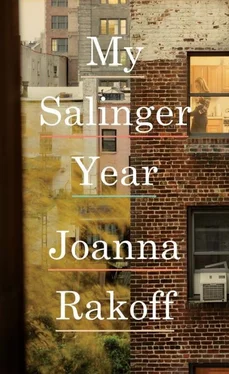But he nodded solemnly. “They ran serious fiction. Still do.” He cleared his throat uncomfortably. “People always say ‘I read it for the articles,’ and you think it’s a joke. But they pay well, so they get good writers.”
“Did my boss sell ‘Hapworth’?” I asked. For some reason my heart raced a little at the thought of this. “To The New Yorker ?”
Hugh shook his head. “No, that was before her time. Dorothy would have handled that. Though I think, by that point, Salinger just gave all his stories directly to The New Yorker .” He sighed and shook his head as if to clear it. “The story is a letter home from camp,” he explained, his voice strangled and strange. Angry, I realized, he’s angry. “Seymour Glass, at age seven, writing to his parents from camp. Sixty pages. A sixty-page letter home from camp .”
“That sounds kind of postmodern,” I said, smiling.
Hugh sighed and raised his eyebrows at me. “People consider this his worst story. I’m not sure why he’d want to publish it as a stand-alone.” Shaking his head, he gestured toward the wall of Salinger books. “He says he doesn’t want attention. This is going to get a lot of attention. I don’t understand.”
“Yes,” I said, nodding, but I thought maybe, just maybe, I understood. Maybe he’s dying , I thought. Maybe he’s lonely. Maybe he wants the attention now. Maybe he realized that what he thought he wanted wasn’t what he wanted at all .
• • •
The next morning, my boss stopped at my desk before heading into her office. “Call this Orchids Press and ask for a catalog and a sample of their books.”
I nodded, but she’d already glided off across the thick carpet. From my shelf, I pulled down the LMP—Literary Market Place , an enormous, dictionary-sized tome, which lists the name and address of every publisher in the country, along with its staff—and sure enough, there it was: Orchises Press, Alexandria, Virginia. Publisher: Roger Lathbury, the Man Who Conquered Salinger. No other staff was listed. I took a deep breath and dialed. “Hello,” a brisk voice chirped midway through the first ring. Was this the man himself, Roger Lathbury? Suddenly I felt silly, unsure of what to say. When I identified myself as an employee of the Agency, would he not immediately realize I was calling on behalf of Salinger? For once, I wished my boss had dictated a letter. “Yes, hello,” I said finally. “Is this Orchises Press?”
“It is,” said the voice.
“I’m calling from the Agency.” Simply uttering the Agency’s name allowed me to regain my composure. “We’re expanding our submission base, and we’d love to see your most recent catalog, as well as a sample of current books.”
“Well,” the man said, “it would be my pleasure to send those materials on to you!” If he recognized the name of the Agency, he gave no indication of it. Or maybe he simply didn’t know that the Agency represented Salinger? After all, he’d written directly to Jerry.
“You did it?” my boss called the minute I hung up. I hadn’t realized that she could hear my phone conversations from her office and flushed a little, thinking what else she might have overheard over the past few months.
“Done,” I called back. There was a rustling as she got up from her chair and walked over to my desk. And another as Hugh joined her.
“Let’s see who they are,” she said. “We need to see what kinds of books they do, what kind of company Jerry will be in. And what the books look like. You know that will matter a lot to Jerry.”
“Really?” I asked. I’d assumed the homogeneous—and singular—style of his books had been purely Little, Brown’s choice. Publishers, I thought, took care of designing books. Writers wrote them.
“Oh boy!” cried my boss. Hugh actually laughed. “You didn’t know that? Jerry has very strong feelings about how a book should look. Not just the cover. The font. The paper. The margins. The binding . No illustrations on his covers. Just text. It’s all stipulated in his contracts.”
“No author photo,” added Hugh. “He almost sued his British publisher over the cover of Nine Stories .”
“That’s an exaggeration,” my boss cried. “He did not sue them. He just was unhappy about it.”
The original cover of The Catcher in the Rye bore an illustration, a strange and beautiful—lyrical, really—drawing of a rearing carousel horse. I could see it out of the corner of my eye while seated at my desk. But that was his first book, predating, I supposed, his ban on images, as well as the sort of fame that allows an author to dictate his covers. In truth, I understood his objection. He wanted his readers to come to his work utterly fresh, utterly free. This, too, was noble. Lovely. But it was also, I suddenly realized, impossible. For J. D. Salinger, that is. No one, no one could come to his books without preconceived notions about them. About him . Myself included.
In the weeks that followed, my lies became true: My shoulder quickly began to ache from toting manuscripts. In reading for Max and Lucy, the texture of my life changed, the fabric of my days growing more and more complex and thrilling. Many of the novels—for they were novels, all novels—that I brought home were indeed bad, as Olivia had promised, but many were good or almost good or at least evidenced a strong and strange voice, and even if I knew that Max or Lucy wasn’t going to take on the writer, there was a certain frisson to being part of the making of a book, however far down the line, of a career, a life. Each time Max or Lucy took on a book I’d recommended, I walked around stunned for days. Reading manuscripts was the exact opposite of reading for grad school: it was pure instinct, with some emotion and intelligence thrown in. Does this novel work? Or can it be made to work? Does it move me? Does it grip me?
At night, I read, happy to have a break from the endless rounds of drinks and parties, a reason to get off the phone with my mother, an excuse to ignore my own imperfect poems—and stories, for I was, ironically, now working on some. I didn’t mention these ventures to anyone, least of all Don.
One afternoon in April, Max came over to my desk, a rarity. He was too busy to come to our wing of the office unless he had pressing business for my boss. Sometimes he asked her advice on contracts, and now, it seemed, he—and Lucy, too—were being made partners, so there were all sorts of complicated legal and financial things to work out. “Hey,” he said, “what are you doing tonight? One of my clients is reading at KGB. I think you might really like his novel. It’s this fantastic coming-of-age story set in New Jersey. And New York, in the ’80s. I really think you might like it. I just have a feeling. Come along. We’ll all have dinner afterward.”
My boss cleared her throat noisily—we were, somehow, disturbing her—and closed her door.
But another, with my name on it, had swung open.
• • •
And yet my boss—and all the older agents—still regarded me as something akin to a piece of furniture, perhaps even more so than when I’d first started. Parked in front of my desk, Carolyn and my boss could while away an hour discussing the quotidian details of their lives: the roasted chicken at such and such restaurant; Carolyn’s attempts to quit smoking by putting her cigarettes in the freezer so they wouldn’t taste as good; the rerouting of the bus that ran through their neighborhood; the perennial troubles of Daniel, who was still adjusting to some new medication. One day in the middle of May—I’d turned twenty-four the week before with little fanfare—as I typed and typed, Carolyn began talking about friends of hers named Joan and John, and their daughter, who had an odd name, an odd name that sounded oddly familiar to me. I’d heard her discuss Joan and John before, but now I realized, with a jolt, that she was talking about Joan Didion and John Gregory Dunne. These were Carolyn’s intimates, the people whose pedestrian travails—bathroom renovations and missed flights—she chattered about. “Who is she?” I asked James the next day. “What’s her story?”
Читать дальше












